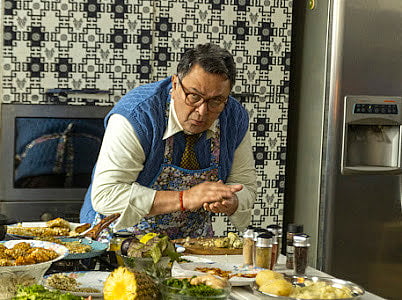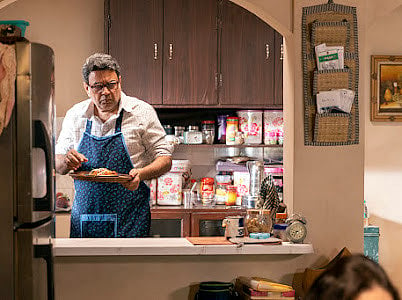Sharmaji Namkeen: Magical masalas / Sweet Delight
Sharmaji Namkeen isn’t just a lovely sendoff for Kapoor, it’s essentially a story full of heart and soul, hope and happiness

What can one say of a film that begins with an image of hot samosas and neat pineapple pastries and goes on to dwell on any and every lip-smacking, artery-clogging dish from the Capital, be it the humble rajma chawal or inimitable chhole bhatoore, the tangy dahi bhalle, cool rabri kulfi or the ubiquitous momos (sorry, dimsums)? Cooking up a veritable storm on screen is none other than Rishi Kapoor in a most winsome posthumous appearance as Sharmaji, the man who mixes magic with masalas in rustling up something as basic as arbi aka taro or colocasia.
I was struck by how most of the significant cooking scenes in Hitesh Bhatia’s delightful debut feature Sharmaji Namkeen have fortuitously been done by Kapoor himself. And he seems effortlessly invested in and excited about the spread he lays out on the table or eats himself, quite like the foodie he is supposed to have been in real life.
Paresh Rawal gamely steps in to fill the shoes of Kapoor, does the scenes which couldn’t be completed due to his demise to create a unique jugalbandi on screen—two actors interpreting one character in their own unique way. You are well aware of this fact—as one of them walks into the scene while the other walks out from the previous—but never distracted by it, the enjoyment of the film isn’t lessened because of it. Ranbir Kapoor’s message at the start of the film is also simple and straight from the heart, amiable, rather than cloying that it could very well have become.

All of it could well be because Sharmaji Namkeen isn’t just a lovely sendoff for Kapoor, it’s essentially a story full of heart and soul, hope and happiness. Bhatia and Supratik Sen write a heartwarming tale where food isn’t just used as a prop to have the audience drooling. Food is food. “Ismein Sikh Isai nahin karte”, goes a line in the film, about how food is all about unifying rather than dividing communities.
Most so, food is the spine and the foundation, the central conceit of the film. It is what leads Sharmaji to finding self-worth and repairs whatever little was broken within himself and in his small world.
The father of two grown up sons finds himself at a loose end on being forced to take VRS from a company he has been loyal to all his working life. He still has lots to do ahead than just hang his boots. His sons are irritated by his obsession with WhatsApp and Facebook and his inability to rest, relax, have fun and enjoy. “Jab se retire hue hain, maata chadh gayi hai sar pe”, as they put it. The film keeps referencing another recent film on the dilemmas and distress of the senior citizens and its iconic stature in people of a certain vintage—Baghbaan, “compulsory life ka piece” as it is described here—but thankfully doesn’t get righteous, sappy, maudlin, and one-sided in its battle of the generations. It understands both the young and the old. Rather than swinging on the extremes, Sharmaji Namkeen cooks up the emotions well—restlessness, exasperation, happiness, anger, anxiety, all in a right mix. In a nutshell, a situation utterly genuine and the feelings identifiable. How no one is Mother Teresa (read, easy to live with).

Relatability is what makes the film work. Be it the individuals, their professional acquaintances, friends or family; be it the societal overview or the family dynamics, Sharmaji Namkeen keeps it real without screaming *naturalism*. It is unaffected and comfortable in its skin. So, even while dealing with the familiar Delhi stereotypes—the loud Chaddhas and Gulatis, their kitschy homes, the kitty party and Baby Doll obsessed, “jaanta hai mera baap kaun hai” Dilli, the Dilli that thinks Dawood or Javed Miandad are prime ministers of Pakistan—the film retains a sparkle and joy and an affection for the quirks of the Capital. I found myself laughing uproariously and indulgently specially at the use of phrases like “beeba Beagle”, “false position mein aa jaungi” and the sharply written and realized, hilariously inspired, mad climax at the Gurgaon police station.
Not just Kapoor and Rawal, each member of the cast—Juhi Chawla, Satish Kaushik, Sheeba Chaddha, Parmeet Sethi, Suhail Nayyar, Ayesha Raza, Taaruk Raina—is in tune with and playing off well against the other. What’s more, they seem to be having a ball on the sets, evident in the exuberance of the ensemble.
But it’s not just all fun either. Without getting weighed down by seriousness and in a pleasant and amusing manner, the film also questions ageism. What is age-appropriate behaviour? Why does an elderly person necessarily have to withdraw and pull back and be stuck with going to a “jaagrit sthal” like Kainchi Dhaam to seem “dignified” and “respectable”? In turn, it also makes a case for dignity of labour. What’s wrong in a senior citizen deploying his skills as a chef, cooking and selling chaat pakodi to the aficionados, if he truly enjoys it and wants to do it? Then there’s also its own feminist statement—why this tendency to look down upon kitty party women, after all every woman has a right to live her life the way she wants to, be it working or playing tambola and dumb charades.

Follow us on: Facebook, Twitter, Google News, Instagram
Join our official telegram channel (@nationalherald) and stay updated with the latest headlines
